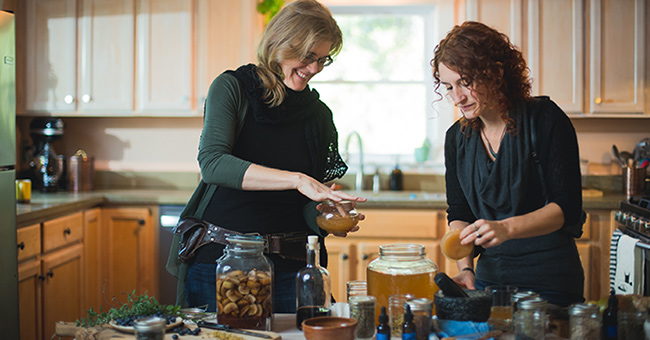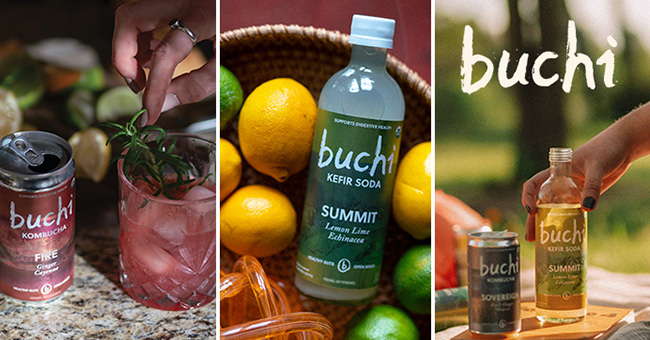A band on the cusp of its heyday and a tugboat pulling large ships out of port. Buchi co-founder and CMO Zane Adams uses these two analogies to bookend his brand’s history, starting from when the kombucha category first gained traction versus its current position within its holding company, private label fermentation-focused manufacturer FedUp Foods.
Launched in 2008, the North Carolina-based kombucha brand began building its private label arm in 2015. According to Adams, the team saw private label manufacturing as the only viable way to scale while pursuing its mission of replacing the “extractive global food system” with one that values regeneration and resilience. With the slowdown of kombucha’s growth happening concurrent to the pandemic, the early focus on broader fermentation capacity may have been fortuitous indeed.
FedUp has been quietly and organically growing over the years, opening a manufacturing facility in South Korea in 2018 and recently starting an expansion of its distribution facility in Irwin, Tennessee, with co-packing capabilities. Over the past 14 years, Buchi’s three-person co-founding team, including Adams, has maintained full ownership, taking low salaries initially and prioritizing slow growth in order to reinvest as much as possible back into the business and fund its broader goals.
“You know when there is a college band and you see them perform some places… and then, seven or eight years later, you hear them on the radio, and you’re like, where were these people? Well, we’ve been here all along,” he said. “We created FedUp really as a means of broadening our platform, not just from kombucha but beyond – looking at fermentation as a really viable technology to help improve the nutrient density of foods, both how they’re grown and then how they’re produced.”
To this end, FedUp is aiming to make products like functional condiments and rehydration immunity packs, but will entertain a wide range of fermentation-focused formats – as long as the client aligns with its ethos. Actions like carbon footprint offset, regenerative agriculture, responsible sourcing, sustainable packaging and climate-efficient shipping are all core to the company’s operations, but above all else, FedUp values resilience in the food system, Adams said.
Co-packing is also a small portion of FedUp’s operations, but Adams emphasized that it is extremely selective about its partner brands and will likely not be the least expensive option available. For example, FedUp sources sugarcane from the Native Green Cane Project in Brazil, a closed-loop, carbon neutral sugarcane processor. However, Adams notes, the ingredient price is slightly more expensive than other suppliers’, something which has ended conversations with some potential clients.

FedUp prioritizes working with diverse and minority suppliers and companies holding certifications like B Corp, Fair Trade, Organic and LEED. However, Adams explained that he does not intend to pursue those certifications for the company itself as the core values of each of those certifications are inherently part of FedUp’s day-to-day operations.
“We went through a lot of meaningful conversations around how to form a business where we baked the impact into the DNA, utilizing the best tools we have at our reach at that time, and ones that we could afford,” he said. “We became a benefit corporation and took that on with FedUp. It is different from a certified B Corp, and I love my certified B Corp… but I also felt like I can utilize that money better than paying for certification by actually deploying the change that’s necessary.”
Those early learnings continue to guide and drive FedUp’s private label business each day. Adams said Buchi gives FedUp a “wonderful conversation” platform between itself and consumers and allows it to remain active and vocal about its values and beliefs while also scaling the business quietly via private label.
“The brand allows us basically to say what we want to say from a political perspective and show our ass when we want to in places that we think makes sense,” said Adams.
As it worked to get its South Korea facility off the ground Buchi also came in with an assist once again. FedUp opened the facility with a South Korean partner and launched a co-branded Buchi kombucha with the client called Buchi Out Alive that is now distributed across China, South Korean, Thailand and Japan. The team has since rebranded, dropping Buchi from its pack, but Adams said merging the team’s learnings and co-branding the launch helped jumpstart its partner’s success.
“I like to think about [Buchi] as a tugboat that’s pushing a really big ass boat into the water,” he joked. “That’s what the brand does. It’s strong and mighty. It’s not going to take you across the sea, but it will get you out of port.”
FedUp’s mission has been carried on that boat as well: the South Korean facility is located in a food basket region that is home to multiple companies developing sustainable and climate-conscience food.
“Community is a process that requires accountability and so we had to be accountable not only to what we said and brewed but also to the people that we were working with and sourcing from,” said Adams. “Profits, power, prosperity – they are just as important to the mission, and the way you get them is just as important as the amount you have.”
Looking ahead, FedUp aims to become more relevant in global conversations about building resilient supply chains including aspects like sustainable packaging, ingredient sourcing and transportation. Adams hopes that in the next five years the company will reach $150 million revenue and be able to have a direct impact on those goals; he also hopes to be well on the way to establishing a perennial food system that benefits all people around the world.
“I hope that our innovation and development team have been able to not just have the breakout products but have a resilient system about thinking around the process of innovation and the future of food and how it’s delivered to not the people who can afford to have a whole paycheck spent at Whole Foods, but communities that are extremely rural, like where we are, black and brown and disadvantaged communities across this country – ones that are starving every day.”

